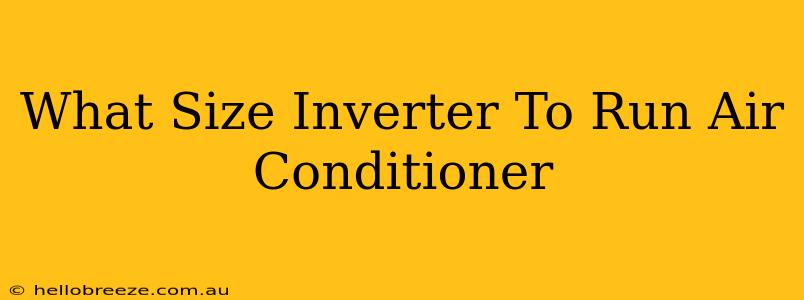Choosing the right inverter for your air conditioner is crucial for efficient and reliable cooling. An undersized inverter will struggle, leading to overheating and potential damage, while an oversized one is wasteful and unnecessary. This guide will help you determine the correct inverter size for your AC unit.
Understanding Inverter AC Units and Their Power Needs
Inverter air conditioners use variable-speed compressors, unlike traditional on/off units. This allows them to adjust their cooling capacity based on the room's temperature, resulting in energy savings and more precise temperature control. The inverter itself is the power converter that allows for this variable speed operation.
Key Factors Affecting Inverter Size:
Several factors influence the size of the inverter you need for your AC unit. These include:
-
AC Unit's Power Consumption (Watts or kW): This is the most critical factor. The inverter must be rated to handle the peak power draw of your air conditioner. This information is usually found on the AC unit's nameplate or in its user manual. Always check this before making any decisions!
-
Starting Current: AC units, especially larger ones, draw a significant surge of current when they initially start up. Your inverter needs to be capable of handling this starting current (often significantly higher than the running wattage).
-
Voltage: Ensure the inverter's voltage rating matches the voltage of your air conditioner and power source. Common voltages are 120V and 240V. Using an incorrectly-volted inverter is dangerous and could damage your equipment.
-
Power Factor: The power factor indicates how efficiently the AC unit uses power. A lower power factor means more power is wasted as heat. Check your AC unit's specifications for this value.
Calculating Inverter Size: A Step-by-Step Guide
-
Find Your AC Unit's Power Consumption: Look for the wattage (W) or kilowatt (kW) rating on the AC unit's label.
-
Determine the Starting Current: This information is sometimes listed on the AC unit's nameplate, but it might require consulting the manual or contacting the manufacturer.
-
Choose an Inverter with a Sufficient Wattage Rating: Select an inverter with a continuous power rating that comfortably exceeds the AC unit's power consumption (wattage) and a surge capacity that comfortably exceeds the starting current. Adding a safety margin of 20-30% is recommended. This ensures the inverter can handle both the normal operation and the initial surge.
-
Verify Voltage Compatibility: Double-check that the inverter's voltage matches your AC unit and power supply.
-
Consider Power Factor: While less critical, choosing an inverter with a decent power factor can further optimize energy efficiency.
Choosing the Right Inverter: Types and Considerations
-
Pure Sine Wave Inverters: These provide the cleanest power, ideal for sensitive electronic equipment like some types of air conditioners. They're generally more expensive but offer superior performance and reliability.
-
Modified Sine Wave Inverters: These are less expensive but may not be suitable for all air conditioners. Check your AC unit's compatibility before using this type of inverter.
-
Off-grid vs. On-grid Inverters: Consider your power source. Off-grid inverters run on batteries, while on-grid inverters connect to a main power supply.
Troubleshooting and Safety Precautions
-
Overheating: If your inverter overheats, it's likely overloaded or improperly ventilated. Ensure adequate cooling.
-
Tripping Breakers: A constantly tripping breaker suggests an oversized AC unit or insufficient inverter capacity.
-
Always consult with a qualified electrician: For complex installations or if you're unsure about any aspect of the process, seek professional help. This is especially important if working with higher voltages.
By carefully considering these factors, you can select the appropriate inverter size for your air conditioner, ensuring efficient cooling and protecting your investment. Remember, safety is paramount – always prioritize proper sizing and adhere to safety guidelines.

